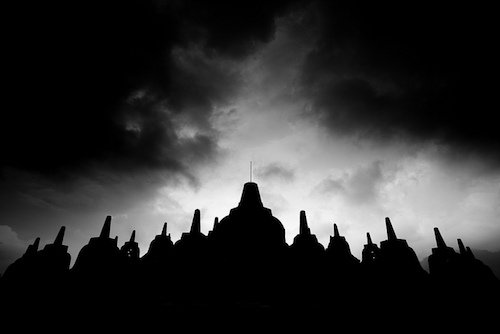We run our website the way we wished the whole internet worked: we provide high quality original content with no ads. We are funded solely by your direct support. Please consider supporting this project.

Storming the Gates of Hell
Jesus said:
“I will build my church, and the gates of Hades will not prevail against it.” (Mt 16:18)
To understand Jesus’ teaching here, there are a few things you should know. First, “Hades” was the standard term for the underworld, which means that Jesus was probably referring to the whole of the Satanic kingdom. Second, the phrase “gates of Hades” is a metaphorical reference to the fortified walls of the Satanic forces. They are closed to keep opposing forces out, and therefore they need to be overcome. Third, Jesus says that these gates will not be able to “prevail against” the church. Jesus is here portraying the church as being on the offensive and Satan’s kingdom as being on the defensive.
Jesus is saying that he is going to build his church on the rock of his divinity—the confession that he is the “Son of the living God”—and the way this church is going to be built will be by bashing down the gates of Satan’s fortress. In other words, the church is to be involved in the very same warfare work that Jesus himself was involved in throughout his ministry. Ministering in his authority and his accomplished victory on the cross, the church is to storm the fortress of Hades and bash down its gates.
Jesus follows this by saying “I will give you the keys to the kingdom of heaven” so that what the church binds and looses on earth will be bound and loosed in heaven. Whatever the church locks up when it bashes down the gates of Hades will be locked up in heaven, and whatever it unlocks and sets free will be set free in heaven. I can only read this as referring to the church’s authority to bind up demonic forces and to set people free.
This teaching provides a blueprint of what the body of Christ is to be about. It is to be about what Jesus was about: aggressively breaking down Satanic fortresses wherever we find them. In people’s lives, in families, in churches and in society at large, the church is to expand the rule of God on the authority of Christ by binding evil and setting people free. In a word, our charter is to live out a theology of revolt, throwing all we are and all we have into guerrilla warfare against the occupying army, the tyrannizing powers of darkness.
—Adapted from God at War, pages 216-217
Photo credit: zoomion via Visual hunt / CC BY-NC-SA
Category: General
Tags: Christian Living, Church, Satan, Spiritual Warfare, Warfare Worldview
Related Reading

Rachel Held Evans on What Drives Millennials (and Others) Away from Church
David Clow via Compfight Have you been wondering why so many churches are dwindling in numbers? Rachel Held Evans was asked to speak about what drives millennials away from church, but her response has struck a nerve with a whole lot of people who are not millennials. It’s time for the church to take a…

Why have you consistently stressed the need for the Western Church to learn from the African Church?
Question: I’ve heard you argue that the white Western church has a lot to learn theologically from African cultures. What is it specifically that you’re referring to? Response: I do strongly believe that the western church needs to humbly sit at the feet of our fellow Christians in Africa. My conviction is based on four…

“The greatest trick the devil ever pulled…”
“…was convincing the world he didn’t exist.” ~Verbal Kint, The Usual Suspects Roger Olson reflected a few days ago on the curious absence of any discussion of Satan in modern theology. He even speculated: I suspect that one reason Greg Boyd, a brilliant theologian, is not taken as seriously as he should be by many…

Does God Intervene?
The Open View of the future recognizes the vast influence of all the angelic and human wills God created, which, in turn, influences the various outcomes and circumstances in life. Therefore life is arbitrary because of the way the decisions made by an unfathomably vast multitude of free agents intersect with each other. How life…

Podcast: Did Jesus Really Engage in Spiritual Warfare, or Was He Simply Playing Along with the Cultural Narratives of His Time?
Greg considers whether Jesus genuinely engaged in spiritual warfare, or if he was simply playing along with the beliefs of those around him. http://traffic.libsyn.com/askgregboyd/Episode_0289.mp3

Sermon Clip: Mystery of the Miraculous
In this week’s sermon clip, Greg Boyd discusses the supernatural gifts of faith, healing, and miracles Christians receive from the Holy Spirit. He describes what each of these gifts are, as well as how we can ask for them and use them in our lives today. View the full sermon here: http://whchurch.org/sermons-media/sermon/mystery-of-the-miraculous
